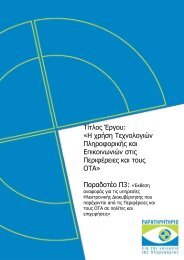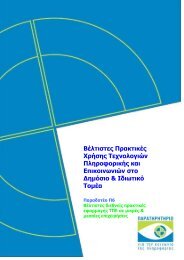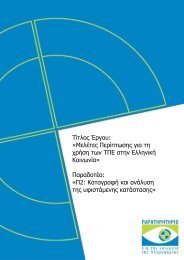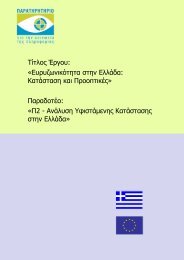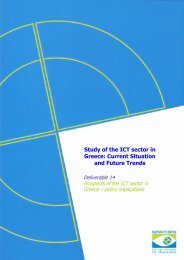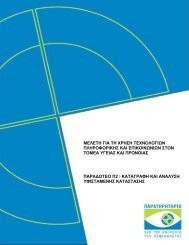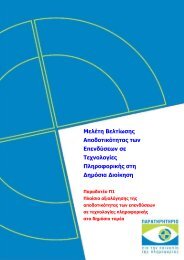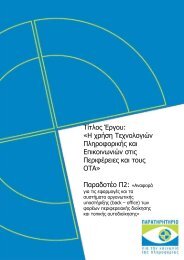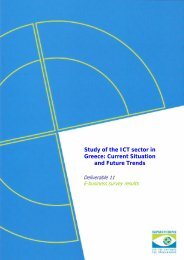«<strong>Evaluation</strong>, <strong>Syn<strong>the</strong>sis</strong> <strong>and</strong> <strong>Formulation</strong> <strong>of</strong> <strong>Proposals</strong> <strong>for</strong> <strong>the</strong> <strong>Use</strong> <strong>of</strong> ICTin <strong>the</strong> Tourism Sector»<strong>and</strong> complement <strong>the</strong> institutional framework <strong>for</strong> <strong>the</strong> promotion <strong>of</strong> certain alternative <strong>for</strong>ms <strong>of</strong> tourismthat have much potential <strong>for</strong> growth in Greece, such as, indicatively, agrotourism, medicinal tourism,sea diving <strong>and</strong> submarine tourism, ship cruising etc.5.3 Thematic Area «ICT <strong>and</strong> Tourism»5.3.1 Introduction: e-Business in Greece <strong>and</strong> <strong>the</strong> Digital DivideThe orderly operation <strong>of</strong> <strong>the</strong> tourist industry relies on <strong>the</strong> provision <strong>and</strong> transmission <strong>of</strong> a large volume<strong>of</strong> in<strong>for</strong>mation (e.g. in<strong>for</strong>mation on features, availability <strong>and</strong> booking <strong>of</strong> tourist products <strong>and</strong> services).As a consequence, a crucial factor <strong>for</strong> <strong>the</strong> increase <strong>of</strong> efficiency <strong>and</strong> <strong>the</strong> creation <strong>of</strong> competitiveadvantages in tourist enterprises is <strong>the</strong> automation <strong>of</strong> business procedures with <strong>the</strong> use <strong>of</strong>technological tools <strong>and</strong> internet applications. In Greece, as repeatedly stated in <strong>the</strong> focus groups, <strong>and</strong>as is also <strong>the</strong> case in all developed international tourist destinations, tourist enterprises largely dependon tour operators to promote <strong>and</strong> market <strong>the</strong>ir products, <strong>and</strong> hesitate to address potential customer<strong>the</strong>mselves. The exploitation <strong>of</strong> <strong>the</strong> internet possibilities is a solution <strong>for</strong> <strong>the</strong> Greek enterprises, inorder to advertise <strong>the</strong>mselves <strong>and</strong> approach potential customers on a global <strong>and</strong> continuous basis.Apart from <strong>the</strong> creation <strong>and</strong> provision <strong>of</strong> innovative promotion <strong>and</strong> sales channels, o<strong>the</strong>r electronicapplications, such as e-learning, e-procurement <strong>and</strong> e-supply chain management can boost acompany’s capabilities <strong>for</strong> pr<strong>of</strong>essional training, development <strong>of</strong> managerial skills, <strong>and</strong> modernization<strong>of</strong> value chain <strong>and</strong> reduction <strong>of</strong> operational cost.In general, business applications <strong>of</strong> e-tourism include <strong>the</strong> supporting <strong>and</strong> innovative provision <strong>of</strong> vitaltourist services, such as e-bookings, e-distribution, e-ticketing, e-procurement, electronic businessmanagement (e.g. e-hotel property management systems), e-destination management systems <strong>and</strong>o<strong>the</strong>r services provided by Β2Β markets <strong>and</strong> Application Service Providers (ASP). These modernbusiness applications require a high degree <strong>of</strong> technological specialization. As a result, today’s touristindustry is complemented by a variety <strong>of</strong> electronic enterprises - mediators. Given that <strong>the</strong> core touristindustry is already much heterogeneous <strong>and</strong> contains numerousdifferent enterprises (accommodation businesses, tourismOnly 4 out <strong>of</strong> 10 smallorganizations, tourist <strong>of</strong>fices, museums, restaurants, transportcompanies, car rental businesses etc.), this results to a moderntourist e-services l<strong>and</strong>scape that is extremely complicated <strong>and</strong>requires a high degree <strong>of</strong> coordination <strong>of</strong> activities betweenenterprises <strong>for</strong> <strong>the</strong> provision <strong>of</strong> seamless high quality touristhotels <strong>and</strong> 2 out <strong>of</strong> 10rent rooms use acomputer <strong>and</strong> evenfewer have accessto <strong>the</strong> internetservices.Version 1Month: December Year: 200736
«<strong>Evaluation</strong>, <strong>Syn<strong>the</strong>sis</strong> <strong>and</strong> <strong>Formulation</strong> <strong>of</strong> <strong>Proposals</strong> <strong>for</strong> <strong>the</strong> <strong>Use</strong> <strong>of</strong> ICTin <strong>the</strong> Tourism Sector»In Greece, as in o<strong>the</strong>r countries, this complexity has resulted to a two-speed tourist economy. Asclearly shown in focus groups (<strong>and</strong> is also mentioned in <strong>the</strong> recent study by <strong>the</strong> Ministry <strong>of</strong>Development e-business <strong>for</strong>um 17 ), <strong>the</strong> digital divide created by <strong>the</strong> e-tourism revolution accentuated<strong>the</strong> differences <strong>and</strong> disadvantages <strong>of</strong> small <strong>and</strong> medium tourist enterprises <strong>and</strong> gave competitiveadvantages to <strong>the</strong> large companies. The results from <strong>the</strong> field research in hotels <strong>and</strong> rent rooms arecharacteristic: only 4 out <strong>of</strong> 10 small hotels (0-9 employees) <strong>and</strong> 2 out <strong>of</strong> 10 rent rooms use acomputer, <strong>and</strong> even fewer have access to <strong>the</strong> internet. Fur<strong>the</strong>rmore, <strong>the</strong>re are significant regionaldifferences: The percentage <strong>of</strong> computer usage in hotels <strong>of</strong> all sizes in Sou<strong>the</strong>rn Greece is 85%, whilethis percentage varies between 64-69% in Central <strong>and</strong> Nor<strong>the</strong>rn Greece. The correspondingpercentages <strong>for</strong> <strong>the</strong> rent rooms are 48% <strong>and</strong> 21-32%. Also, <strong>the</strong> hotels in isl<strong>and</strong>s st<strong>and</strong> out withrespect to advanced use <strong>of</strong> ICT.The large tourist enterprises, in many cases members <strong>of</strong> multinational groups, have adopted <strong>the</strong>electronic applications in tourism to <strong>the</strong> full extent, using also modern methods <strong>for</strong> <strong>the</strong>ir management.As mentioned in <strong>the</strong> focus groups discussions, <strong>the</strong> situation is also good in smaller new units ownedby young people familiar with technology. These entrepreneurs are aware <strong>of</strong> <strong>the</strong> need to adopt newICT, because <strong>the</strong>y underst<strong>and</strong> <strong>the</strong> modern competitive market <strong>and</strong> look <strong>for</strong> co operations (<strong>for</strong> examplewith car rental businesses) that favour / dem<strong>and</strong> <strong>the</strong> promotion through ICT. This category does notdepend on tour operators.On <strong>the</strong> o<strong>the</strong>r h<strong>and</strong>, <strong>the</strong>re is <strong>the</strong> considerable mass <strong>of</strong> small, usually family enterprises that haveminimal or no familiarization with modern technology. These are old family businesses, with ownersprimarily relying on <strong>the</strong>ir loyal customers, who cannot underst<strong>and</strong> <strong>the</strong> need to adopt modern ICT.Moreover, as it was shown in <strong>the</strong> field research in hotels <strong>and</strong> rent rooms, those owners that do notuse ICT at all do not intend to change anything in <strong>the</strong> way <strong>the</strong>y conduct <strong>the</strong>ir business in <strong>the</strong>immediate future.However, <strong>the</strong> largest number <strong>of</strong> businesses lies in <strong>the</strong> middle transitional stage, unable to complete<strong>the</strong> change from <strong>the</strong> one end to <strong>the</strong> o<strong>the</strong>r, <strong>the</strong>re<strong>for</strong>e maintaining <strong>the</strong> digital divide. Businesses in thiscategory usually have only a website <strong>and</strong> a booking <strong>for</strong>m. These are <strong>the</strong> enterprises that are <strong>of</strong> <strong>the</strong>most interest in <strong>the</strong> context <strong>of</strong> <strong>the</strong> present study. The main problems addressed are <strong>the</strong> increase <strong>of</strong><strong>the</strong>ir ICT awareness <strong>and</strong> <strong>the</strong> ways to make <strong>the</strong>m move faster in this course.It should be noted that <strong>the</strong> digital divide is also evident in <strong>the</strong> comparison between public <strong>and</strong> privatesectors, as well as between sectors. As it will be discussed later, <strong>the</strong> private sector seems to per<strong>for</strong>m17 «Electronic services <strong>and</strong> <strong>the</strong>ir applications in tourism: Current situation <strong>and</strong> perspectives».Version 1Month: December Year: 200737
- Page 1 and 2: Project Title“Study for the Penet
- Page 3 and 4: «Evaluation, Synthesis and Formula
- Page 5 and 6: «Evaluation, Synthesis and Formula
- Page 7 and 8: «Evaluation, Synthesis and Formula
- Page 9 and 10: «Evaluation, Synthesis and Formula
- Page 11 and 12: «Evaluation, Synthesis and Formula
- Page 13 and 14: «Evaluation, Synthesis and Formula
- Page 15 and 16: «Evaluation, Synthesis and Formula
- Page 17 and 18: «Evaluation, Synthesis and Formula
- Page 19 and 20: «Evaluation, Synthesis and Formula
- Page 21 and 22: «Evaluation, Synthesis and Formula
- Page 23 and 24: «Evaluation, Synthesis and Formula
- Page 25 and 26: «Evaluation, Synthesis and Formula
- Page 27 and 28: «Evaluation, Synthesis and Formula
- Page 29 and 30: «Evaluation, Synthesis and Formula
- Page 31 and 32: «Evaluation, Synthesis and Formula
- Page 33 and 34: «Evaluation, Synthesis and Formula
- Page 35: «Evaluation, Synthesis and Formula
- Page 39 and 40: «Evaluation, Synthesis and Formula
- Page 41 and 42: «Evaluation, Synthesis and Formula
- Page 43 and 44: «Evaluation, Synthesis and Formula
- Page 45 and 46: «Evaluation, Synthesis and Formula
- Page 47 and 48: «Evaluation, Synthesis and Formula
- Page 49 and 50: «Evaluation, Synthesis and Formula
- Page 51 and 52: «Evaluation, Synthesis and Formula
- Page 53 and 54: «Evaluation, Synthesis and Formula
- Page 55 and 56: «Evaluation, Synthesis and Formula
- Page 57 and 58: «Evaluation, Synthesis and Formula
- Page 59 and 60: «Evaluation, Synthesis and Formula
- Page 61 and 62: «Evaluation, Synthesis and Formula
- Page 63 and 64: «Evaluation, Synthesis and Formula
- Page 65 and 66: «Evaluation, Synthesis and Formula
- Page 67 and 68: «Evaluation, Synthesis and Formula
- Page 69 and 70: «Evaluation, Synthesis and Formula
- Page 71 and 72: «Evaluation, Synthesis and Formula
- Page 73 and 74: «Evaluation, Synthesis and Formula
- Page 75 and 76: «Evaluation, Synthesis and Formula
- Page 77 and 78: «Evaluation, Synthesis and Formula
- Page 79 and 80: «Evaluation, Synthesis and Formula
- Page 81 and 82: «Evaluation, Synthesis and Formula
- Page 83 and 84: «Evaluation, Synthesis and Formula
- Page 85 and 86: «Evaluation, Synthesis and Formula
- Page 87 and 88:
«Evaluation, Synthesis and Formula
- Page 89 and 90:
«Evaluation, Synthesis and Formula
- Page 91 and 92:
«Evaluation, Synthesis and Formula
- Page 93 and 94:
«Evaluation, Synthesis and Formula
- Page 95 and 96:
«Evaluation, Synthesis and Formula
- Page 97 and 98:
«Evaluation, Synthesis and Formula
- Page 99 and 100:
«Evaluation, Synthesis and Formula
- Page 101 and 102:
«Evaluation, Synthesis and Formula
- Page 103 and 104:
«Evaluation, Synthesis and Formula
- Page 105 and 106:
«Evaluation, Synthesis and Formula
- Page 107:
«Evaluation, Synthesis and Formula



